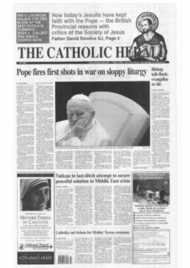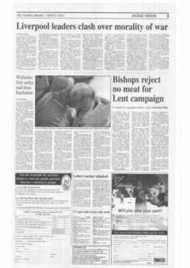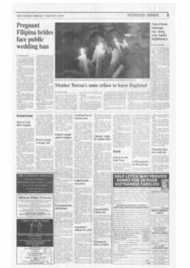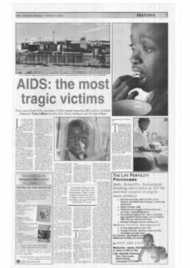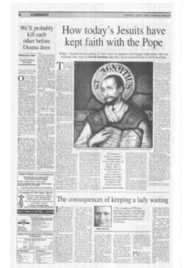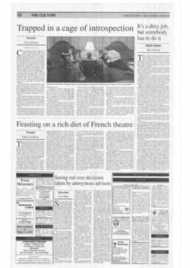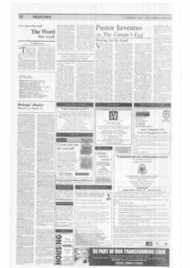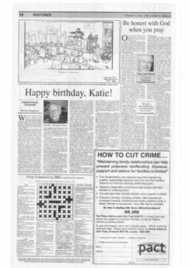Page 3, 7th March 2003
Page 3

Report an error
Noticed an error on this page?If you've noticed an error in this article please click here to report it.
Tags
Share
Related articles
Carey Says Farewell To A 'beloved Brother'
Anglican Bishops Demand Access To Communion
Rowan Williams To Visit Pope In Autumn
Meeting Rekindles Unity Hopes
Anglican Unity Under Strain
Williams: first unity and then Eucharist
BY LUKE COPPEN
ANGLICANS and Catholics frustrated by the lack of progress towards unity should not defy restrictions on intercommuMon, the new Archbishop of Canterbury has said.
Dr Rowan Williams said there were "good theological reasons" why Anglicans and Catholics could not yet receive Holy Communion in each other's churches.
Speaking on Vatican Radio's One-O-Five Live station, the Anglican primate said it was not useful for "local options to be encouraged on intercommunion". He said both the Anglican Communion and the Catholic Church took a public stand on the issue and were justified in doing so.
The archbishop's comments contrast strikingly with those of his predecessor as Archbishop of Canterbury, Dr George Carey. Dr Carey repeatedly appealed for Anglicans to be admitted to Holy Communion in Catholic churches as a prelude to full, visible unity.
In April 1998, Dr Carey used a sermon in Luxembourg cathedral to make a bold appeal for the lifting of the ban on intercommunion. He said it hurt "to be denied the Lord's Supper by a fellow disciple of Christ".
In his interview, Dr Williams said that Christian unity remained "an enormous priority". But he said that the
Anglican Communion needed to reconcile that priority with the need to be true to its own "foundational commitments".
He said: "I think a great deal can be done, particularly the sharing of prayer. In a special way the collaboration between Roman Catholics and Anglicans in the area of the religious life. The monastic life is one of the great growing points. I think that's one of the ecumenical secrets of the future."
Dr Williams said that theological dialogue on the sacrament of baptism could also bring the two communions closer. He praised Pope John Paul H's "extraordinary depth of understanding" of such fundamental theological issues and paid tribute to the Pontiff's theology of the human person.
"Much of what he's writ
ten has been an inspiration for me in this," he said.
Last Friday, Pope John Paul II sent a bishop's pectoral cross and a message pledging continued work toward full Church unity to the newly enthroned archbishop.
The cross and message were delivered by the Pope's top ecumenical official, Cardinal Walter Kasper, who met Dr Williams the day after his enthronement.
In the message, the Pope told the archbishop that he wanted to continue on the path to full communion begun by their predecessors.
He wrote: "We can sincerely rejoice in the fact that, in recent decades, our predecessors have developed an increasingly close relationship, even bonds of affection, through constructive
dialogue and close communication
"Despite disagreements and obstacles, we are still on that path, and irrevocably committed to it. Over the past decade, the various opportunities to meet Dr George Carey have been particularly helpful and encouraging, signs of progress on our ecumenical journey. The work of the AnglicanRoman Catholic International Commission, and the more recently formed International Commission for Unity and Mission, continue to move us forward.
"We are both aware that overcoming divisions is no easy task, and that full communion will come as a gift of the Holy Spirit. That same Spirit prods and guides us even now to continue to seek a resolution to remain
ing areas of doctrinal disagreement, and to engage more profoundly in common witness and mission."
In his enthronement homily, Archbishop Williams said the Anglican Church would be effective in the future only "if it is concerned first with gratitude and joy".
"Orthodoxy flows from this, not the other way around, and we don't solve our deepest problems just by better discipline but by better discipleship, a fuller entry into the intimate joy of Jesus' life," he said In an interview with the Daily Telegraph last month, Dr Williams said he had once considered becoming a Catholic, but could not accept the concept of papal infallibility or the Church's theology of grace.
blog comments powered by Disqus


